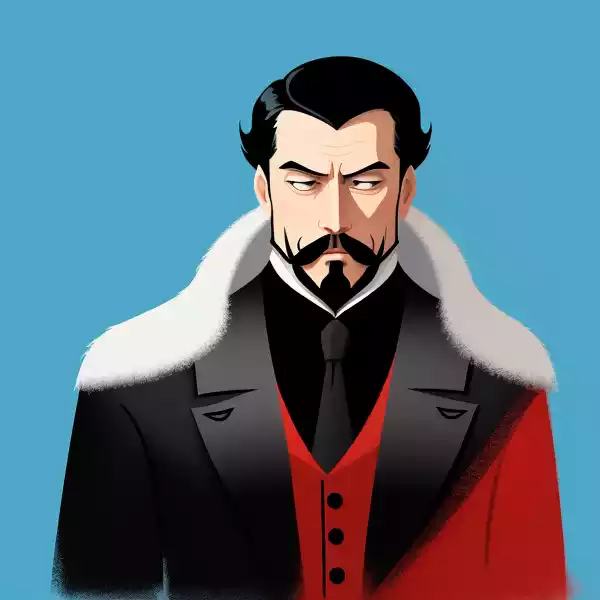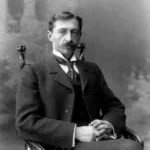 | |
The Gentleman from San Francisco | |
| Author | Ivan Bunin |
|---|---|
| Published |
1907
|
| Language | English |
| Original Language | Russian |
| Nationality | Russian |
| Genre | Russian Literature |
1907 Short Story
The Gentleman from San Francisco
The Gentleman from San Francisco is an English Russian Literature short story by Russian writer Ivan Bunin. It was first published in 1907.
The Gentleman from San Francisco
by Ivan Bunin
Alas, alas, that great city Babylon, that mighty city! the apocalypse
The gentleman from San Francisconeither at Naples nor at Capri had anyone remembered his namewas journeying to the Old World for two full years, with wife and daughter, wholly for recreation.
He felt firmly assured that he had every right to take a rest, pleasure, in a prolonged and comfortable journey, and other things besides. For such an assurance he had the good reason, that, in the first place, he was rich, and that, in the second, in spite of his fifty-eight years, he was only just taking his first plunge into life. Before this he had not lived but merely existedto be sure, not so badly, but none the less putting all his hopes in the future. He had laboured diligentlythe coolies, whom he had employed by the thousands, knew well what this meant!and at last he saw that much had been achieved, that he was now equal to those he had at one time appointed as his models, and he decided to give himself a well-earned rest. It was a custom among his kind of people to begin the enjoyments of life with a journey to Europe, to India, to Egypt. He proposed to follow their example. Before all, of course, he desired to reward himself for his years of hard toil; nevertheless, he was happy also for his wife’s and daughter’s sakes. His wife had never been distinguished for any particular susceptibility to fresh impressions, but then all elderly American women are ardent travellers. As for his daughter, a girl no longer young and somewhat ailing, the journey would do her positive good: to say nothing of the benefits her health would derive, was there not always the likelihood of happy encounters during journeys? While travelling one may indeed, at times, sit at the same table with a millionaire; or enjoy looking at frescoes in his company.
The itinerary planned by the gentleman from San Francisco was an extensive one. In December and January he hoped to enjoy the sun of Southern Italy, the monuments of antiquity, the tarantella, serenades of strolling singers, and another thing for which men of his age have a peculiar relish, the love of young Neopolitan women, conferredlet us admitnot with wholly disinterested motives; he planned to spend the Carnival in Nice, in Monte Carlo, toward which the most select society gravitated at this season, that society upon which all the blessings of civilization depend; not alone the cut of the smoking jacket, but also the stability of thrones, and the declaration of wars, and the welfare of hotelswhere some devote themselves with ardor to automobile and sail races, others to roulette, while a third group engages in what is called flirting; while a fourth in shooting pigeons which, emerging from their shelters, soar upward above emerald-green lawns, against the background of a sea of the colour of forget-me-nots, only in the next instant to strike the ground as crumpled little shapes of white. The beginning of March he wanted to devote to Florence; on the eve of the Passion of Our Lord to arrive at Rome, in order to hear the Miserere there; his plans also included Venice, and Paris, and bullfights in Seville, and sea-bathing in the British Isles, and Athens, and Constantinople, and Palestine, and Egypt, and even Japannaturally, on the return journey . . . And everything went splendidly at first.
It was the end of November; almost to Gibraltar itself the ship proceeded now through an icy mist, now through a storm with wet snow; but it sailed on unperturbed and even without rolling; the passengers on the steamer were many, and all of them persons of consequence; the ship the famous Atlantisresembled the most expensive of European hotels, with all conveniences; an all-night bar, Turkish baths, a newspaper of its own, and life upon it flowed in accordance with a splendid system of regulations; the passengers rose early, to the sound of bugles, sharply reverberating through the passages at the yet dark hour when day was so slowly and reluctantly dawning above the gray-green watery desert, ponderously restless in the mist. They put on their flannel pyjamas, drank coffee, chocolate, cocoa; then they reclined in marble bath-tubs, performed exercises, awakening an appetite and a sense of well-being, attended to their daily toilet and went to breakfast. Until eleven they were supposed to promenade the decks lustily, breathing in the cool freshness of the ocean, or to play at shuffle-board and other games for a renewed stimulation of the appetite; and at eleven, to seek refreshment in bouillon and sandwiches; after which they read their newspaper with pleasure and calmly awaited lunch, a meal even more nourishing and varied than the breakfast; the following two hours were dedicated to repose; all the decks were then arranged with chaises longues, upon which the travellers reclined, covered up with plaid rugs, contemplating the cloudy sky and the foaming billows flashing by beyond the rail, or else gently drowsing. At five o’clock, enlivened and refreshed, they were served with strong fragrant tea and pastries; at seven, the bugle call announced dinner, consisting of nine courses . . . . At this point the gentleman from San Francisco, greatly cheered, would hurry to his magnificent cabin de luxe, to dress.
In the evening the tiers of the Atlantis gaped through the dusk as with fiery, countless eyes, and a great multitude of servants worked with especial feverishness in the kitchens, sculleries, and wine vaults. The ocean, heaving on the other side of the walls, was terrifying, but none gave it a thought, firmly believing it under the sway of the captain,a red-haired man of monstrous bulk and ponderousness, always seeming sleepy, resembling, in his uniform frock-coat, with its golden chevrons, an enormous idol; it was only very rarely that he left his mysterious quarters to appear in public. A siren on the forecastle howled ceaselessly in hellish sullenness and whined in frenzied malice, but not many of the diners heard the siren,it was drowned by the strains of a splendid stringed orchestra, playing exquisitely and without pause in the two-tiered hall, decorated with marble, its floors covered with velvet rugs; festively flooded with the lights of crystal lustres and gilded girandoles, filled to capacity with diamond-bedecked ladies in décoletté and men in smoking jackets, graceful waiters and deferential maîtres d’hôtel,among whom one, who took orders for wines exclusively, even walked about with a chain around his neck, like a lord mayor. A smoking jacket and perfect line made the gentleman from San Fancisco appear very much younger. Spare, not tall, awkwardly but strongly built, groomed until he shone and moderately animated, he sat in the aureate-pearly refulgence of this palatial room, at a table with a bottle of amber Johannesberg, with countless goblets, small and large, of the thinnest glass, with a fragrant bouquet of curly hyacinths. There was something Mongolian about his yellowish face with clipped silvery moustache; his large teeth gleamed with gold fillings; his stalwart, bald head glistened like old ivory. Rich, yet in keeping with her years, was the attire of his wife,a big, broad, calm woman; elaborate, yet light and diaphanous, with an innocent frankness, was that of his daughter,a girl innocently frank, tall, slender, with magnificent hair, exquisitely dressed, with breath aromatic from violet cachous with the tenderest of tiny moles about her lips and between her shoulder blades, slightly powdered. . . .
The dinner went on for two whole hours; after dinner there was dancing in the ball-room, during which the men,the gentleman from San Francisco among their number, of course, with their feet cocked up, decided, upon the basis of the latest political and stock-exchange news, the destinies of nations, smoking Havana cigars and drinking liqueurs until their faces were flushed, while seated in the bar, where the waiters were Negroes in red jackets, the whites of their eyes resembling peeled, hard-boiled eggs. The ocean, with a dull roar, was moving in black mountains on the other side of the wall; the snow-gale whistled fiercely through the soaked rigging; the whole ship quivered as it mastered both the gale and the mountains, sundering to either side, as though with a plough, their shifting masses, which again and again boiled up and flung themselves high, with tails of foam; the siren, stifled by the fog, was moaning with a deathly anguish; the lookouts up in their crow’s-nest froze with the cold and grew dazed from straining their attention beyond their strength. Akin to the grim sultry depths of the infernal regions, akin to their ultimate, their ninth circle, was the womb of the steamer, below the water line,that womb where dully gurgled the gigantic furnaces, devouring with their fiery maws mountains of hard coal, cast into them by men stripped to the waist, purple from the flames, and with smarting, filthy sweat pouring over them; while here, in the bar, men threw their legs over the arms of their chairs with never a care, sipping cognac and liqueurs, and were wafted among clouds of spicy smoke as they indulged in refined conversation; in the ball-room everything was radiant with light and warmth and joy; couples were now whirling in waltzes, now swaying in the tango,and the music insistently, in some delectably-shameless melancholy, supplicated always of one, always of the same thing . . . . There was an ambassador among this brilliant throng,a lean, modest little old man; there was a rich man,clean-shaven, lanky, of indeterminate years, and with the appearance of a prelate, in an old-fashioned frock-coat; there was a well-known Spanish writer; there was a world-celebrated beauty, already just the very least trifle faded and of an unenviable morality; there was an exquisite couple in love with each other, whom all watched with curiosity and whose happiness was unconcealed: he danced only with her; sangand with great abilityonly to her accompaniment; everything they did was carried out so charmingly; and only the captain knew that this pair was hired by Lloyd’s to play at love for good money, and that they had been sailing for a long time, now on one ship, now on another.
At Gibraltar everybody was gladdened by the sun,it seemed like early spring; a new passenger, whose person aroused the general interest, made his appearance on board the Atlantis,he was the hereditary prince of a certain Asiatic kingdom, travelling incognito; a little man who somehow seemed to be all made of wood, even though he was agile in his movements; broad of face, with narrow eyes, in gold-rimmed spectacles; a trifle unpleasant owing to the fact that his skin showed through his coarse black moustache like that of a corpse; on the whole, however, he was charming, simple, and modest. On the Mediterranean Sea there was a whiff of winter again; the billows ran high, were as multi-coloured as the tail of a peacock, and had snowy-white crests, due, in spite of the sparklingly bright sun and perfectly clear sky, to a tramontana, a chill northern wind from beyond the mountains, that was joyously and madly rushing to meet the ship. . . . Then, on the second day, the sky began to pale, the horizon became covered with mist, land was nearing; Ischia, Capri appeared; through the binoculars, Napleslumps of sugar strewn at the foot of some dove-coloured masscould be seen; while over it and this dove-coloured object were visible the ridges of distant mountains, vaguely glimmering with the dead whiteness of snow. There was a great number of people on deck; many of the ladies and gentlemen had already put on short, tight fur coats, with the fur outside; Chinese boys, patient and always speaking in a whisper, bow-legged striplings with pitch-black queues reaching to their heels and with eyelashes as long and thick as those of young girls, were already dragging, little by little, sundry plaids, canes, and portmanteaux and grips of alligator bide toward the companion-ways. . . . The daughter of the gentleman from San Francisco was standing beside the prince, who had been, by a happy chance, presented to her yesterday evening, and she pretended to be looking intently into the distance, in a direction he was pointing out to her, telling, explaining something or other to her, hurriedly and quietly. On account of his height he seemed a boy by contrast with others,he was odd and not at all prepossessing of person, with his spectacles, his bowler, his English great coat, while his scanty moustache looked just as if it were of horse-hair, and the swarthy, thin skin seemed to be drawn tightly over his face, and somehow had the appearance of being lacquered,but the young girl was listening to him, without understanding, in her perturbation, what he was saying; her heart was thumping from an incomprehensible rapture in his presence and from pride that he was speaking with her, and not some one else; everything about him that was different from others,his lean hands, his clear skin, under which flowed the ancient blood of kings, even his wholly unpretentious, yet somehow singularly neat, European dress, everything held a secret, inexplicable charm, evoked a feeling of amorousness. As for the gentleman from San Francisco himself,he, in a high silk hat, in gray spats over patent-leather shoes, kept on glancing at the famous beauty, who was standing beside him,a tall blonde of striking figure, with eyes painted in the latest Parisian fashion; she was holding a diminutive, hunched-up, mangy lap dog on a silver chain and was chattering to it without pause. And the daughter, in some vague embarrassment, tried not to notice her father.
Like all Americans of means, he was very generous while travelling, and, like all of them, believed in the full sincerity and good-will of those who brought him food and drink with such solicitude, who served him from morn till night, anticipating his slightest wish; of those who guarded his cleanliness and rest, lugged his things around, summoned porters for him, delivered his trunks to hotels. Thus had it been everywhere, thus had it been on the hip, and thus it had to be in Naples as well. Naples grew, and drew nearer; the musicians, the brass of their instruments flashing, had already clustered upon the deck, and suddenly deafened everybody with the triumphant strains of a match; the gigantic captain, in his full-dress uniform, appeared upon his stage, and, like a gracious pagan god, waved his hand amiably to the passengers,and to the gentleman from San Francisco it seemed that it was for him alone that the march so beloved by proud America was thundering, that it was he whom the captain was felicitating upon a sale arrival. And every other passenger felt similarly about himselfor herself. And when the Atlantis finally entered the harbour, heaved to at the wharf with her many-tiered mass, black with people, and the gang-planks clattered down,what a multitude of porters and their helpers in caps with gold braid, what a multitude of different commissionaires, whistling gamins, and strapping ragamuffins with packets of coloured postal cards in their hands, made a rush toward the gentleman from San Francisco, with offers of their services! And he smiled, with a kindly contemptuousness, at these ragamuffins, as he went toward the automobile of precisely that hotel where there was a likelihood of he prince’s stopping. He drawled through his teeth, now in English, now in Italian:
“Go away! Via!”
Life at Naples at once assumed its wonted, ordered routine: in the early morning, breakfast in the gloomy dining-room with its damp draught from windows opening on some sort of a stony little garden. The sky was overcast, holding out little promise, and there was the usual crowd of guides at the door of the vestibule; then came the first smiles of a warm, rosy sun. From the high hanging balcony Vesuvius came into view, enveloped to its foot by radiant morning mists, and the silver-and-pearl eddies on the surface of the Bay, and the delicate contour of Capri against the horizon. One could see tiny burros, harnessed in twos to little carts, running down below over the quay, sticky with mire, and detachments of diminutive soldiers, marching somewhere to lively and exhilarating music. Next came the procession to the waiting automobile and the slow progress through populous, narrow, and damp corridors of streets, between tall, many-windowed houses; the inspection of lifelessly-clean museums, evenly and pleasantly, yet bleakly, lighted, seemingly illuminated by snow; or of cool churches, smelling of wax, which everywhere and always contain the same things: a majestic portal, screened by a heavy curtain of leather, and inside,empty vastness, silence, quiescent tiny flames of a seven-branched candle-stick glowing redly in the distant depths, on an altar bedecked with laces; a solitary old woman among the dark wooden pews; slippery tombstones underfoot; and someone’s “Descent from the Cross,”it goes without saying, a celebrated one. At one o’clock there was luncheon upon the mountain of San Martino, where, toward noon, not a few people of the very first quality gathered, and where the daughter of the gentleman from San Francisco had once almost fainted away for joy, because she thought she saw the prince sitting in the hall, although she already knew through the newspapers that he had left for a temporary stay at Rome. At five came tea at the hotel, in the showy salon, so cosy with its rugs and flaming fireplaces; and after that it was already time to prepare for dinner,and once more came the mighty clamour of the gong reverberating through the hotel; once more the moving queues of ladies in décolleté, rustling in their silks upon the staircases and reflected in all the mirrors; once more the palatial dining-room, widely and hospitably opened, and the red jackets of the musicians upon their platform, and the black cluster of waiters about the maître d’hôtel, who, with inordinate skill, was ladling some sort of thick, reddish, soup into plates. . . . The dinners, as everywhere else, were the crowning glory of each day; the guests dressed for them as for a party, and these dinners were so abundant in edibles, and wines, and mineral waters, and sweets, and fruits, that toward eleven o’clock at night the chambermaids were distributing through all the rooms rubber bags with not water to warm the stomachs.
As it happened, the December of that year proved to be not a wholly successful one for Naples; the porters grew confused when one talked with them of the weather, and merely shrugged their shoulders guiltily, muttering that they could not recall such a year,although it was not the first year that they had been forced to mutter this, and to base their statement on that “something terrible is happening everywhere”; there were unheard of storms and torrents of rain on the Riviera; there was snow in Athens; Etna was also all snowed over and was aglow at night; tourists were fleeing from Palermo in all directions, to escape from the cold. The morning sun deceived the Neapolitans every day that winter: toward noon the sky became gray and a fine rain began falling, but grew heavier and colder all the time; then the palms near the entrance of the hotel glistened as though they were of tin, the town seemed especially dirty and cramped, the museums curiously alike; the cigar stumps of the corpulent cabmen, whose rubber-coats flapped in the wind like wings, seemed to have an insufferable stench, while the energetic snapping of their whips over their scrawny-necked nags was patently false; the foot-gear of the signori sweeping the rails of the tramways seemed horrible; the women, splashing through the mud, their black-haired heads bared to the rain, appeared hideously short-legged; as for the dampness, and the stench of putrid fish from the sea foaming at the quay,there was nothing to be said. The gentleman and the lady from San Francisco began quarreling in the morning; their daughter either walked about pale, with a headache, or, coming to life again, went into raptures over everything, and was, at such times both charming and beautiful: beautiful were those tender complex emotions which had been awakened within her by meeting that unsightly man through whose veins flowed uncommon blood; for, after all is said and done, perhaps it is of no actual importance just what it is, precisely, that awakens a maiden’s soul,whether it be money, or fame, or illustrious ancestry. . . . Everybody asserted that things were quite different in Sorrento, in Capri,there it was both warmer and sunnier, and the lemons were in blossom, and the customs were more honest, and the wine was better. And so the family from San Francisco resolved to set out with all its trunks to Capri, and, after seeing it all, after treading the stones where the palace of Tiberius had once stood, after visiting the faery-like caverns of the Blue Grotto, and hearing the bag-pipers of Abruzzi, who for a whole month preceding Christmas wander over the island and sing the praises of the Virgin Mary, they meant to settle in Sorrento.
On the day of departure,a most memorable one for the family from San Francisco!there was no early morning sun. A heavy fog hid Vesuvius to the very base; this gray fog spread low over the leaden swell of the sea that was lost to the eye at a distance of a hall a mile. Capri was quite invisible,as if there had never been such an island in the world. And the tiny steamer that set out for it was so tossed from side to side that the family from San Francisco was laid prostrate upon the divans in the sorry general cabin of this tiny steamer, their feet wrapped up in plaid rugs, and their eyes closed. The mother suffered,so she thought,more than anybody; she was overcome by sea-sickness several times; it seemed to her that she was dying, while the stewardess, who always ran up to her with a small basin,she had been, for many years, day in and day out, rolling on these waves, in sultry weather and in cold, and yet was still tireless and kind to everybody,merely laughed. The daughter was dreadfully pale and held a slice of lemon between her teeth; now she could not have been comforted even by the hope of a chance meeting with the prince at Sorrento, where he intended to be about Christmas. The father, who was lying on his back, in roomy overcoat and large cap, never opened his jaws all the way over; his face had grown darker and his moustache whiter, and his head ached dreadfully: during the last days, thanks to the bad weather, he had been drinking too heavily of evenings, and had too much admired the “living pictures” in the haunts of manufactured libertinage. But the rain kept on lashing against the jarring windows, the water from them running down on the divans; the wind, howling, bent the masts, and at times, aided by the onslaught of a wave, careened the little steamer entirely to one side, and then something in the hold would roll with a rumble. During the stops at Castellamare, at Sorrento, things were a trifle more bearable, but even then the rocking was fearful,the shore, with all its cliffs, gardens, pine-groves, its pink and white hotels and hazy mountains clad in wavy greenery, swayed up and down as if on a swing; boats bumped up against the sides of the ship; sailors and steerage passengers were shouting fiercely; somewhere, as if it had been crushed, a baby was wailing and smothering; a raw wind was blowing in at the door; and, from a swaying boat with the flag of the Hotel Royal, a lisping gamin was screaming, luring travellers: “Kgoya-al! Hôtel Kgoya-al! . . .” And the gentleman from San Francisco, feeling himselt to be incredibly old,which was as it should be,was already thinking with sadness and loathing of all these Royals, Splendids, Excelsiors, and of these greedy, insignificant little men, reeking of garlic, called Italians. Once, having opened his eyes and raised himself from the divan, he saw, underneath the craggy barrier on the shore, a cluster of stone hovels mouldy through and through, stuck one on top of another near the very edge of the water, near boats, near all sorts of rags, tins, and brown nets,hovels so wretched, that, at the recollection this was the very Italy he had come here to enjoy, he felt despair. . . . Finally, at twilight, the dark mass of the island began to draw near, seemingly bored through and through by little red lights near its base; the wind became softer, warmer, more fragrant; over the abating waves, as opalescent as black oil, golden serpents flowed from the lanterns on the wharf. . . . Then came the sudden rumble of the anchor, and it fell with a splash into the water; the savage shouts of the boatmen, vying with one another, floated in from all quarters,and at once the heart grew lighter, the lamps in the general cabin shone more brightly, a desire arose to eat, to drink, to smoke, to be stirring. . . . Ten minutes later the family from San Francisco had descended into a large boat; within fifteen minutes it had set foot upon the stones of the wharf, and had then got into a bright little railway car and to its buzzing started the ascent of the slope, amid the stakes of the vineyards, half-crumbled stone enclosures, and wet, gnarled orange trees, some of them under coverings of straw,trees with thick, glossy foliage, aglimmer with the orange fruits; all these objects were sliding downward, past the open windows of the little car, toward the base of the mountain. . . . Sweetly smells the earth of Italy after rain, and her every island has its own, its especial aroma!
On this evening the island of Capri was damp and dark. But now for an instant it came into life; lights sprang up here and there, as always on the steamer’s arrival. At the top of the mountain, where stood the station of the funicular, there was another throng of those whose, duty it was to receive fittingly the gentleman from San Francisco. There were other arrivals, but they merited no attention,several Russians, who had settled in Capri,absent-minded because their bookish meditations, unkempt, bearded, spectacled, the collars of their old frayed overcoats turned up; and a group of long-legged, long-necked, round-headed German youths in Tyrolean costumes, with canvas knapsacks slung over their shoulders; these stood in no need of anybody’s services, feeling themselves at home everywhere, and knowing how to practise the strictest economies, The gentleman from San Francisco, on the other hand, who was calmly keeping aloof from both the one group and the other, was immediately observed. He and his ladies were promptly helped out, some men running ahead of him to show him the way. Again he was surrounded by urchins, and by those stalwart Caprian wives who bear on their heads the portmanteaux and trunks of respectable travellers. The wooden pattens of these women clattered over a little square, which seemed to belong to some opera, an electric globe swaying above it in the damp wind. The rabble of urchins burst sharp, bird-like whistles,and, as if on a stage, the gentleman from San Francisco proceeded in their midst toward some mediæval arch underneath houses that had become merged into one mass, beyond which a little echoing street,with the tuft of a palm above flat roofs on its left, and with blue stars in the black sky overhead,led slopingly to the now visible grand entrance of the hotel, all agleam with light. . . . And again it seemed that it as, in honour of the guests from San Francisco that this dump little town of stone on a craggy little island of the Mediterranean Sea had come to life, that it was they who had made the proprietor of the hotel so happy and affable, that it was only for them that the Chinese gong began to sound the summons to dinner through all the stories of the hotel, the instant they had set foot in the vestibule.
The proprietor, a young man of courtly elegance, who had met them with a polite and exquisite bow, for a minute dumbfounded the gentleman from San Francisco. After a glance at him, the gentleman from San Francisco suddenly remembered that just the night before, among the confusion of numerous images which had beset him in his sleep, he had seen precisely this gentleman,just like him, down to the least detail: in the same sort of frock with rounded skirts, and with the same pomaded and painstakingly combed head. Startled, he almost paused. But since, from long, long before, there was not even a mustard seed of any sort of so-called mystical emotions left in his soul, his astonishment was dimmed the same instant; as he proceeded through a corridor of the hotel, he spoke jestingly to his wife and daughter of this strange coincidence of dream and reality. And only his daughter glanced at him with alarm at that moment her heart suddenly contracted from sadness, from a feeling of their loneliness upon this dark alien island,a feeling so strong that she almost burst into tears. Nevertheless, she said nothing of her feelings to her father,as always.
An exalted personageRais XVIIwho had been visiting Capri, had just taken his departure. And now the guests from San Francisco were conducted to the same apartments that he had occupied. To them was assigned the ablest and handsomest chambermaid, a Belgian, whose waist was slenderly and firmly corseted, and whose tiny starched cap looked like a scalloped crown; also, the best-looking and most dignified of flunkies, a fiery-eyed Sicilian, black as coal; and the nimblest of bell-boys, the short and stout Luigi,a fellow who was very fond of a joke, and who had served many masters in his time. And a minute later there was a slight tap at the door of the room of the gentleman from San Francisco,the French maître d’hôtel had come to find if the newly arrived guests Would dine, and, in the event of an answer in the affirmative,of which, of course, there was no doubt,to inform them that the carte de jour consisted of crawfish, roast beef, asparagus, pheasants, and so forth. The floor was still rocking under the gentleman from San Francisco,so badly had the atrocious little Italian steamer tossed him about,but, without hurrying, with his own hands, although somewhat awkwardly from being unaccustomed to such things, he shut a window that had banged when the maître d’hôtel had entered and had let in the odours of the distant kitchen and of the wet flowers in the garden, and with a lingering deliberateness replied that they would dine, that their table must be placed as far as possible from the door, at the other end of the dining-room, that they would drink local wine and champagne,moderately dry and only slightly chilled. The maître d’hôtel approved every word of his, in most varied intonations, having, in any case, but one significance,that there was never a doubt, nor could there possibly be any, about the correctness of the wishes of the gentleman from San Francisco, and that everything would be carried out with precision. In conclusion he inclined his head, and asked deferentially:
“Will that be all, sir?”
And, having received in answer a leisurely “Yes,” he added that the tarantella would be danced in the vestibule to-night,the dancers would be Carmella and Giuseppe, known to all Italy, and to “the entire world of tourists.”
“I have seen her on post cards,” said the gentleman from San Francisco in a wholly inexpressive voice. “As for this Giuseppe,is he her husband?”
“Her cousin, sir,” answered the maitre d’hôtel.
And, after a brief pause, during which he appeared to be considering something, the gentleman from San Francisco dismissed him with a nod.
And then he once more began his preparations, as if for wedding ceremony: he turned on all the electric lights, filling all the mirrors with reflections of light and glitter, of furniture and opened trunks; he began shaving and washing, ringing the bell every minute, while other impatient rings from his wife’s and daughter’s rooms sounded through the entire corridor and interrupted his. And Luigi, in his red apron, was rushing forward to answer the bell, with an agility peculiar to many stout men, not omitting grimaces of horror that made the chambermaids, running by with glazed porcelain pails in their hands, laugh till they cried. He knocked on the door with his knuckles, and asked with an assumed timidity, with a deference which verged on idiocy:
“Ha sonato,







